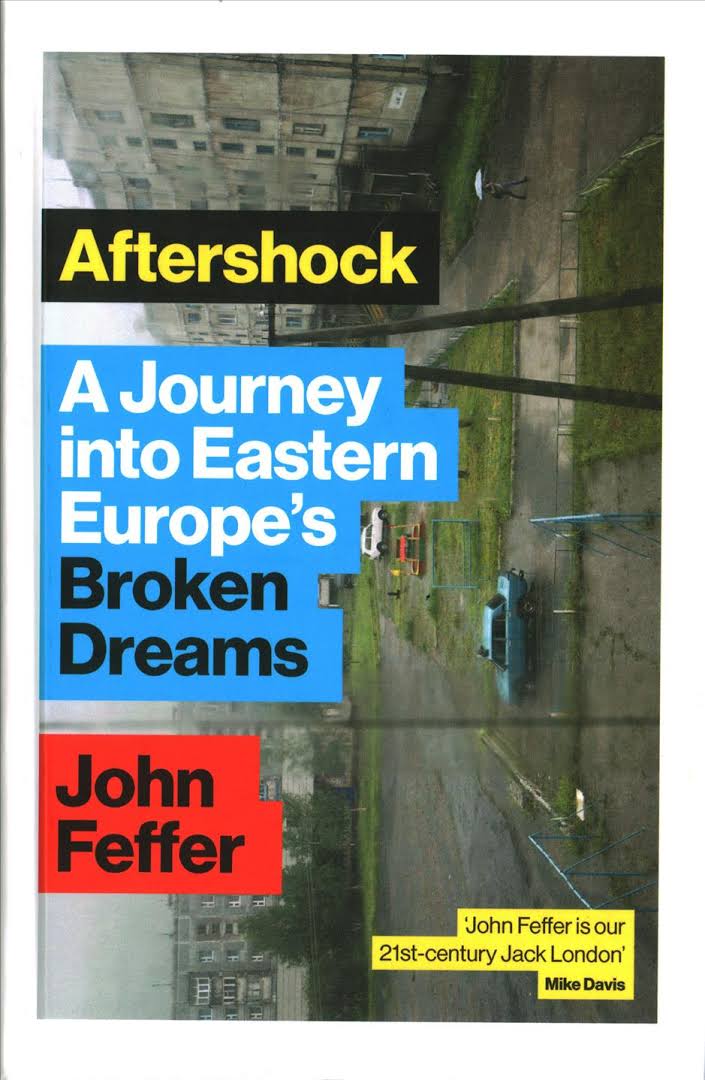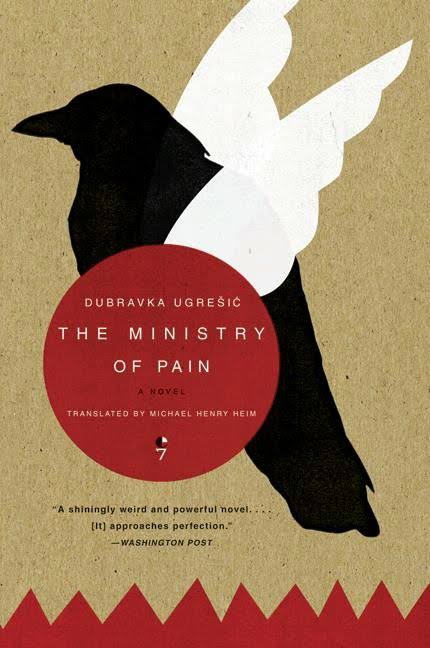 Feffer’s Aftershock: A journey into Eastern Europe’s Broken Dreams documents how the brown shirts moved into the vacuum left by the collapse of communism. (Part I is at Review Aftershock)
Feffer’s Aftershock: A journey into Eastern Europe’s Broken Dreams documents how the brown shirts moved into the vacuum left by the collapse of communism. (Part I is at Review Aftershock)
East Europeans are making good use of their new proportional representative democracy, allowing protest movements to gain access to parliament. Poland’s Andrzej Lepper founded Samoobrona (Self defense) in 1990 to help indebted farmers, the unemployed and pensioners, and quickly had 15% of the popular vote. In 2005 he became minister of agriculture and deputy prime minister in the Law and Justice government, which is similar to the other east European rightist parties -- a brown-red coalition, conservative culturally, vaguely socialist in economics.
Recipe: Collapse, discredit socialism, discredit liberalism -> fascism. Again Hungary does the counter-reformation with flair. A leader of the 1989 overthrow of socialism, Viktor Orban soon regretted the mess that he helped throw Hungary into, and founded a "national conservative" party Fidesz (Alliance of Young Democrats), rising to prime minister from 1998 to 2002 and 2010 to the present, now with a 'super majority' which he uses to amend the constitution in the face of EU protests over his policies.
In 2003, Orban stated that liberalism has fulfilled its historic mission, that there is no need for further destruction. In 2014, Orban announced his plans to create “a new Hungarian state” that adopts political economic systems in Singapore, Russia, China, India and Turkey. He shocked both left and right by suggesting Russia was the more natural partner than the EU. He angered his 'alt-right' cousins in the rest of Europe by supporting the Turkish bid to join the EU, being a devotee of turanism linking Turks and Hungarians, though he has hounded Soros for “attempting to destroy the Hungarian nation and Europe's Christian identity by promoting the settlement of millions of Muslim migrants.”
.
As Orban and his party gentrified, a more left wing spin-off, Jobbik (Movement for a Better Hungary), gained traction among young voters, denouncing financial elites, inequality, and calling for government help to the disadvantaged, though Jobbik is still racist against Roma. The popular opinion throughout eastern Europe now is anti-EU, which translates as anti-globalization.
Left or right are less and less meaningful. Everyone sees the foolishness now of thinking the EU will be a friendly big brother. Just look at what they did to Greece and now Spain. The Warsaw Pact countries were forced to look to the EU after their stern but fair big brother the Soviet Union collapsed. Now the idea of renewing Comecon trade links is taking hold, and Eurasianism is the new buzzword. Bulgaria’s Ataka calls for renationalizing industries from foreigners, and supported a seamstress strike at a German-owned factory (but also got a ban on veils).
It is not so much xenophobia, but the result of losing any fleeting sense of independence within the EU, a sense of powerlessness in an organization where you are from the start considered second rate, and where the German-led economic monolith controls your every move. The Soviet big brother was in many ways less oppressive. Hungarians were at the top then.
Slovakia was the right wing bellwether, with the rise of a strongman, Vladimír Meciar in 1992, and the 'velvet divorce' from its Czech partner in 1993. He served three times as prime minister from 1990 to 1998. As membership in NATO and the EU in 2004 came on the horizon, liberal pressure was able to push him from public office, though his right wing autocratic style was spreading across the region.
While Roma are more underdogs than ever, with 90% unemployment everywhere, and an unofficial apartheid keeping them in ghettos, other ethnic minorities are tolerated and continue their slow assimilation. Bulgaria’s sizable Turkish minority set up a Movement for Rights and Freedom as a political party, despite the constitution forbidding ethnic political parties. They allied with the communists who needed an ally during transition, and got laws changed so they could have Turkish names, schools, universities, even some control of agricultural funding from the EU.
The Hungarian minority in Romania faced worsening discrimination at first. In 1992 Cluj’s mayor Gheorghe Funar tried to ban an ethnic Hungarian political party, but when the economy collapsed, people dropped the phony ‘Hungarian danger’. Nationalism petered out as locals wanted competent people (but not Roma). The EU added more logic to the idea of forgetting old ethnic squabbles. How to help the Roma is distressing, living in the same black hole as Canadian natives or Palestinians, oppressed by their ‘white’ overlords and living in squalor. The EU is some help, having declared 2005--15 the Roma Decade, but little of the money trickled down, and the anti-Roma prejudice continues.
Reforms?
As the transition’s devastation is settling down, what’s new?
*Initial excitement about the EU has given way to frustration. Brexit would be repeated almost everywhere if referenda were held. Eurasia is the new mantra for at least Hungary.
*Free trade has also taken a beating. Tariffs and government steering of infant industries is seen as logical. Poland’s 17 investor assistance centers and 32 business parks for new technology were successful in reviving smaller cities and shaping their new economic life.
*Comecon links are only now being restored, after their rupture bankrupted many and the fledgling states were forced to compete with the slick West.
*A second post-collapse generation is now emerging that is suspicious, if not cynical, about the West. Yugoslavia’s fame as a counterculture haven endures despite the civil war.
*There is even flirting with monarchy. Bulgaria invited King Simeon II to return after living in Spanish exile, but he was not much of a success as prime minister (2001--05), not even fluent in Bulgarian. Havel’s sister-in-law Dagmar, a founder of Civic Forum told Feffer she was a monarchist, arguing that some symbol of morality at a higher level is necessary even if the symbol is just a vision.
*There is a higher civic involvement in local politics, a push for more local control -- what the EU dubs subsidiarity.
The collectivist ideology of the communists and the spirit of solidarity of the right wing opposition are both animated by older republican virtues -- a focus on public good. There is no room/ need for liberalism. Squatters in Slovenia, Serbia and East Germany were able to carve out a small anarchist hold on abandoned buildings and force some real grassroots democracy into their new political order. ‘Islands of positive deviation’. In EUspeak, cutting edge subsidiarity. Hungary’s LMP (Politics can be different) is the latest inspired party: holistic, environmental, social justice oriented, beyond ethnic problems (except Roma).
EU?
Poland, Hungary, Czechia, Slovenia joined in 2004, Romania, Bulgaria, Slovakia in 2007, Croatia in 2013. So far the news is mostly negative. Only a minority view EU positively. None got the earlier more generous regional development funds. Poland is worried about unemployment, agriculture, national values. Slovenia was forced to privatize remaining state-held properties after 2008 when it experienced a debt default (selling them at a lower price than if there was no recession). National governments realized they had no power unless they ‘did a Hungary’.
Katalin Mezey: “They talk of muticulturalism, but the reality is uniformity -- the hollywoodization of culture.” Workers (and communists) ceded authority to (western) intellectuals and they to economists. Solidarnost’ bowed out of the political process. NGOs pick up the welfare slack that previously governments handled. I.e., the privatization and professionalization of civil society. NGOs must abide by foreigners for grants, which makes for rigidity, alien planning. Much of the money goes back to donor countries.
Rural opposition is strongest, despite the common agricultural program, 40% EU expenditures. But the story wasn’t totally grim. Pushed by market relations, Poles on their small farms couldn’t make a profit, so sold them, leading to industrial farming and no jobs. But removing subsidies for fertilizers had the positive effect of reducing waste and pushing farmers to be more scientific, more competitive. Poland went from net importer of food to next exporter by 2002, though this success story wasn’t repeated elsewhere.
The most shocking effect of EU membership (and capitalism): EU money actually increased differences between regions even as overall poverty levels rose. Success breeds success, but it’s zero sum. I.e., failure breeds failure. Good city infrastructure means fast growth, more jobs, in a feedback process. Also, the money not filter down to those at the bottom.
A nice, weird anecdote: In Bulgaria, computer programming was the most advanced in the socialist bloc, but the West did not want competition, so bought up and closed the research facilities, leaving the workers to their own devices. Bad move. In revenge they created great viruses for their hostile takeoverers. A sharp westerner company invited the virus inventors to work abroad for them. Brain drain with a difference.
If you still call yourself a liberal, take a closer look. With the collapse of communism, new independent countries were left on their own in a neolib environment. Democracy = just another way to create a wealthy elite, with shuffles of corrupt elite factions/ rotating kleptocracy using lies and crises. The liberal social model ate away at the solidarity of family, neighbourhood, and community, all of which help people through difficult times. Globalization = anonymous colonization via the corporation.
We haven’t even touched on the pyramid scams* or lustration,** the tragedy of Yugoslavia or the poor GDR, whose histories from the victims’ point of  view are very different that the victors’ version we in the West are fed, if we bother to read them at all.
view are very different that the victors’ version we in the West are fed, if we bother to read them at all.
There is no question for Roma that the new order is a living hell, that socialism was just fine. Both Yugos and Ossies*** have their Yugonostalgia and Ostalgia (only 16% wanted reunification with West Germany in December 1989). Hungary/ Yugoslavia 1960s+ were good, open systems, providing security to people, a thriving culture. One of the characters in Croatian novelist Dubravka Ugresic’s Ministry of Pain laments:
We had been deprived of the country we were born in and the right to a normal life; we had been deprived of our language; we had experienced humiliation, fear and helplessness; we had learned what it means to be reduced to a number, a pack.
Glimmers of hope
The new concern for the environment cuts through economic systems. There is a wholescale shift to organic in the EU, including east Europe. Apparently the love of McDonalds is only skin deep.
Subsidiarity means local production is preferred as fresher and involving no transport costs. The left is slowly rebuilding, as the weaknesses and inhumanity of capitalism is experienced first hand. ‘Real existing socialism’ was more just, but was utopian, ultimately boring, static, missing the spontaneity that capitalism thrives on. There is always the need for a vision of utopia, experimental freedom.
Serbian activist Sonja Licht warned Feffer in 2012: “We had the huge tragedy of Stalinism. Then we had the huge tragedy of fascism. And I’m afraid this third thing, this neoconservative, neoliberal imposed model, will be the third huge tragedy. It has brought out such egoism in each society, in people, in states.”
xxx
*Albania -pyramid scams destroyed the government in 1997.
** Cleansing a new regime from the remnants of the past by publishing the security files and persecuting wrong-doers.
*** East Germans
http://balkanspost.com/article/600/aftershock-communism-minus-soviet-power-nationalism





